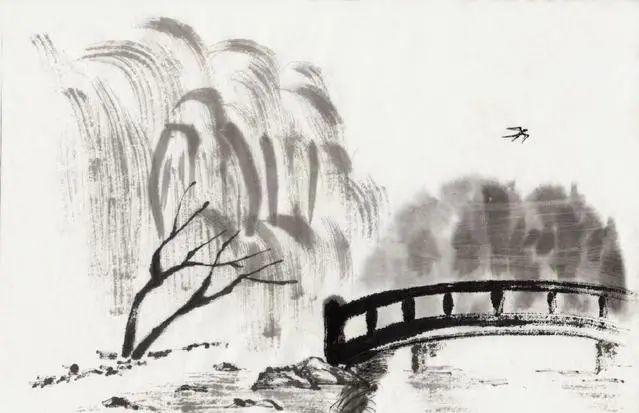Poetry hunting every day
Pay attention to the reading dogs
As we all know, near-body poetry, also known as Gelug poetry, is the most typical poetic genre of Tang poetry. In the near-body poems, there are also verses and absolute sentences, and according to the number of words in each sentence, they are divided into seven words and five words, so there are generally only seven laws and five laws, seven absolute five absolute four poetic styles, and such as the law of arrangement and the six absolutes are quite rare, and they are rarely summarized.
Relatively speaking, the rhythm poem has eight sentences, which can form a complete beginning and turning, so it is more suitable for the theme of speech, and the style is more serious and neat; while the absolute sentence is only four sentences, leaving a lot of blank space, suitable for writing scene lyricism, the style is more subtle and timeless, especially the seven words and absolute sentences, graceful and beautiful and endless, the Tang Dynasty and even after the Tang Dynasty, many extremely beautiful poems are written in seven absolutes!

For example: "The late man said the Yellow Crane Tower in the west, fireworks fell in Yangzhou in March", "The rain during the Qingming Dynasty, the pedestrians on the road want to break their souls", "Wet apricot blossom rain, blowing noodles are not cold willow wind" and so on are all famous passages in the seven sentences.
Today's introduction to you is a seven-word sentence, but this sentence is not a Tang poem, but a farewell poem made by an anonymous family in the Sui Dynasty, which can be said to be the earliest seven absolute poems in history, which can be called the ancestor of the seven absolutes!
"
Farewell poem
Sui Anonymous
Willow green hanging on the ground,
Yang Hua was long and stirring up the sky.
The wicker is folded and the flowers are all flown,
Borrowing the question of whether pedestrians return?
"
We know that the near-body poetry was only fixed and matured in the early Tang Dynasty, and the Six Dynasties and Sui Dynasties before this were all in the stage of development, and poets began to consciously adjust the rules. Among them, there are some masterpieces that are closer to the near-body poetry or even mature.
This "Farewell Poem" is a mature seven-word poem of the Sui Dynasty, and the rhyme of the Pingqi Gelu and so on fully meet the standards of the Tang Dynasty's Seven Absolute Poems, and even its poetic style and artistic conception are similar to Tang poetry. If you don't know it in advance, I'm afraid that many people will mistake it for Tang poetry!
The poem is as the title suggests, it is a farewell poem with a broken willow. The first two sentences are quite stunning: "The willows are green and hanging on the ground, and the yang flowers are long and stirring up the sky"! Not only is the battle neat, but the tone and mood are natural and beautiful, unintentionally carved and natural and fresh!
The last two sentences suddenly turned, the willow flowers flew out, the spring was twilight, and why "the wicker was broken", it turned out that the original send-off person came here every day, folded the wicker, but still did not see the return of the person who traveled far! The phrase "ask the pedestrians not to return" is full of days and nights of hope and lovesickness!
From the beginning of the "willow green hanging on the ground" clearly the willow is intact, naturally it is a willow to send farewell, to the later "willow folding flowers fly out" but can not look forward to the return of pedestrians! Although it is a "farewell poem", it is actually a love poem that has spent a spring and autumn! Feelings of mourning, lingering pity, reading sentences beautiful and timeless meaning, its artistic charm, indeed do not lose Tang poetry!